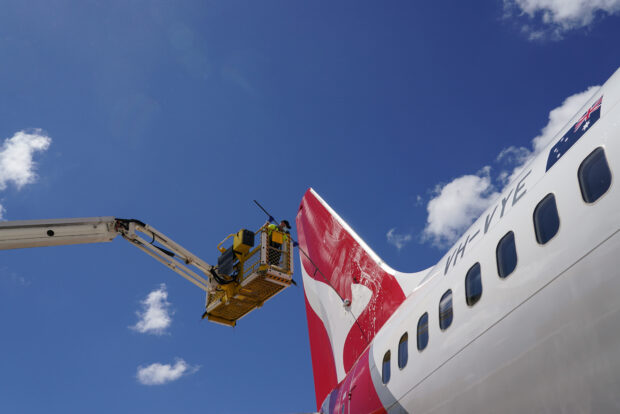
An aircraft appearance crew member cleans an aircraft as Qantas begins preparing and equipping planes for the return of international flights, in anticipation of Australia easing coronavirus disease (COVID-19) border regulations, at Sydney Airport in Sydney, Australia. REUTERS/Loren Elliott/file photo
Australia’s Qantas Airways on Thursday announced an order for 24 widebody aircraft, the final piece of the company’s jet fleet renewal program, and said the move is aimed at replacing its current Airbus A330 and Airbus A380 aircraft.
The multi-billion dollar order is split between 12 Airbus A350s and 12 Boeing 787s, which will arrive from fiscal 2027 and into the next decade, Qantas said.
As a part of the deals, Qantas will gain access to up to 500 million liters of sustainable aviation fuel (SAF) per annum which would start to flow from 2028.
This has the potential to meet up to 90 percent of the group’s interim SAF target for 2030, Qantas said.
Global airline companies have been struggling hard to cut down on emissions and are looking for alternatives to traditional jet kerosene fuels.
“SAF reduces lifecycle carbon emissions by up to 80 percent and is a key part of Qantas’ emissions reduction plan,” it said.
“Qantas clearly believes that demand will continue, ordering 24 new planes to meet demand and saying demand will remain above pre-COVID levels,” said Josh Gilbert, market analyst at eToro AUS Capital.
Qantas during the day posted a record profit with shares up 1.9 percent in early trade.
Incoming CEO Vanessa Hudson will not have a one-way ticket to success when she takes over in November, but this may just be a new era of good times for the flag carrier of Australia, added Gilbert.
Hudson said in June the carrier would kickstart a competition to replace existing A330 jets by end-year.
“Both the 787-9 and 787-10 offer enhanced efficiency, flexibility and passenger comfort to connect Australia and destinations around the world,” said Stan Deal, president and CEO of Boeing Commercial Airplanes.
Reuters earlier in the week had reported, citing industry sources, that Boeing was nearing a deal for its 787 Dreamliner aircraft with Qantas.


